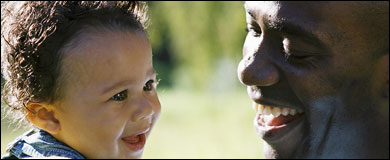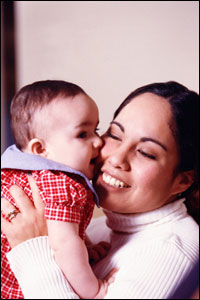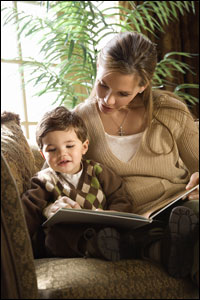Babies & Toddlers: Learn Some Positive Parenting Tips
 Discover (or rediscover) positive ways that you can help your baby or toddler learn and develop.
Discover (or rediscover) positive ways that you can help your baby or toddler learn and develop.This is the first in a series of articles about positive parenting tips.
Proper nutrition, exercise, and rest are very important for children's health and development. Providing a safe and loving home and spending time with your child – playing, singing, reading, and even just talking – can also make a big difference in his or her development. Discover positive ways to help the development of your baby or toddler.

Infants (0–1 year old)
Cognitive development for your baby means the learning process of memory, language, thinking and reasoning. Your baby is learning to recognize the sound of your voice. She is also learning to focus her vision from the periphery or the corner of her eyes to the center.
Your baby's language development is also important during this time. Language development is more than uttering sounds ("babble"), or mama/dada. Listening, understanding, and knowing the names of people and things are all components of language development. During this stage, your baby is also developing bonds of love and trust with you. The way you cuddle, hold, and play with your baby will set the basis for how he will interact with you and others. Listening, understanding, and knowing the names of people and things are all components of language development. During this stage, your baby is also developing bonds of love and trust with you. The way you cuddle, hold, and play with your baby will set the basis for how he will interact with you and others.
Positive Parenting Tips
- Talk to your baby. It is soothing to hear your voice.
- When your baby makes sounds, answer him by repeating and adding words. This will help him learn to use language.
- Read to your baby. This helps her develop and understand language and sounds.
- Sing to your baby.
- Play music. This helps your baby develop a love for music and math.
- Praise your baby and give him lots of loving attention.
- Spend time cuddling and holding your baby. This helps her feel cared for and secure.
- The best time to play with your baby is when he's alert and relaxed. Watch your baby closely for signs of being tired or fussy so that you can take a break.
- Parenting can be hard work! Take care of yourself physically, mentally, and emotionally. It is easier to enjoy your new baby and be a positive, loving parent when you are feeling good yourself.
More information is available in English or in Spanish.

Toddlers (1–2 years old)
During this time, your child is becoming increasingly more mobile, and aware of himself and his surroundings. Her desire to explore new objects and people is also increasing. During this stage, your toddler will show greater independence, begin to show defiant behavior, recognize himself in pictures or a mirror, and imitate the behavior of others, especially adults and older children.
Your toddler will also be able to recognize names of familiar people and objects, form simple phrases and sentences, and follow simple instructions and directions
Positive Parenting Tips
- Keep reading to your toddler daily.
- Ask her to find objects for you or name body parts and objects.
- Play matching games with your toddler.
- Encourage him to explore and try new things.
- Help to develop your toddler's language by talking with her.
- Encourage your toddler's curiosity and ability to recognize common objects by taking field trips together to the park or a bus ride.
More information is available in English or in Spanish.

Toddlers (2–3 years old)
Because of your child's growing desire to assert her independence, this stage is often called the "terrible twos." However, this can be an exciting time for you and your toddler. He will experience huge intellectual, social, and emotional changes that will help him to explore his new world, and make sense of it.
During this stage, your toddler will be able to follow two- or three-phrase commands, sort objects by shape and color, imitate the actions of adults and playmates, and express a wide range of emotions.
Positive Parenting Tips
- Set up a special time to read books with your toddler.
- Encourage your child to engage in pretend play.
- Play parade or follow the leader with your toddler.
- Help your child to explore her surroundings by taking her on a walk or wagon ride.
- Encourage your child to tell you his name and age.
- Teach your child simple songs like Itsy Bitsy Spider, or other cultural childhood rhymes.
More information is available in English or in Spanish.
More Information
- Learn more about child development.
- Listen to a podcast.
- Positive Parenting Tips: Babies (
 2:34 mins)
2:34 mins) - Positive Parenting Tips: Toddlers (
 3:09 mins)
3:09 mins)
- Positive Parenting Tips: Babies (
- Learn about developmental milestones and warning signs of possible developmental delays from CDC's "Learn the Signs. Act Early." campaign.
- Check out CDC's information on Safe and Healthy Kids and Teens.
- Learn about preventing child maltreatment
- Review sites linked from CDC's Infants & Toddlers Top Resources
View page in
Current Features
Series on Positive Parenting Tips

